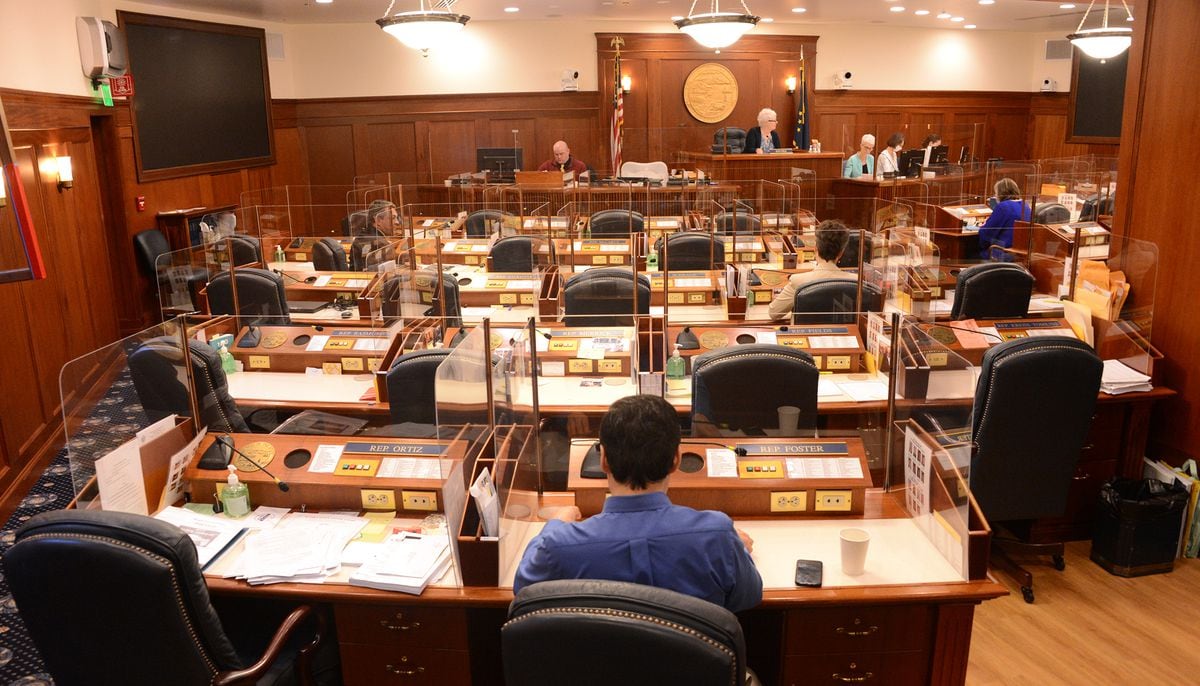
JUNEAU — The Alaska Legislature’s ongoing special session is more than halfway over, and there’s no sign yet of an agreement on the state’s budget for the coming year. If lawmakers don’t pass — and Gov. Mike Dunleavy doesn’t sign — a state budget before July 1, state government will shut down, and with it will shut down a swath of key services.
Lawmakers say that dire scenario isn’t likely, but with lawmakers split over the amount of this year’s Permanent Fund dividend, there’s a growing risk that the budget will pass House and Senate by only a small majority, without a procedural vote known as the “reverse sweep.”
Without the reverse sweep, thousands of Alaska high school students may instantly lose their college scholarships. In rural Alaska, electricity rates could soar. Fishermen could lose access to low-interest loans.
“It’s a really big deal for our membership,” said Bill Stamm, president and CEO of the Alaska Village Electric Cooperative, which serves 58 communities, mostly in rural Alaska.
“Their electrical rates would probably double,” he said.
Alaska’s constitution bans dedicated budget accounts for specific recurring programs. On June 30 each year, any accounts are automatically swept into the state’s Constitutional Budget Reserve.
But lawmakers have long used a procedural workaround to preserve funding for favored projects. Each year, with the support of three-quarters of the House (30 of 40 members) and three-quarters of the Senate (15 of 20), they vote to make a “reverse sweep.” The money goes into the budget reserve at 11:59 p.m. June 30, and it gets pulled right back out at 12:01 a.m. July 1.
This procedure has been normalized so much that the state’s budget is written as if the reverse sweep is a foregone conclusion. Programs are paid for with money from designated funds, and some of those funds automatically collect fees or investment earnings for later use.
The PCE fund, now worth over $1 billion, subsidizes residential electricity prices in rural Alaska. The higher education fund gives college scholarships to Alaska high school students.
Since 2016, the Alaska House has been closely divided between a coalition majority and a Republican minority. Getting the 30 votes needed for the reverse sweep requires both sides to agree.
Two years ago, the minority sought increase the amount of that year’s Permanent Fund dividend and withheld its votes on the reverse sweep to get leverage.
Letters went out to high school students and their families saying that money was unavailable to pay their scholarships. Electrical companies serving rural Alaska warned that sudden rate increases were imminent.
The minority subsequently agreed to a deal that restored funding, and in a COVID-hurried session last year, lawmakers didn’t attempt to use the reverse sweep as a negotiating tool.
Jeff Turner, a spokesman for the governor, said in a written statement the administration expects that the Legislature will vote on and pass the reverse sweep this year. He didn’t say when.
The reverse sweep isn’t expected to be an issue in the Senate, but it is expected to be one in the House, where the majority supports a dividend of no more than $1,000, but many Republicans want a dividend of about $2,300, in line with a long-term proposal endorsed by Dunleavy.
Rep. Bart LeBon, R-Fairbanks, said getting to 30 votes on the budget this year will be “more difficult than it was last year and the year before.”
House Minority Leader Cathy Tilton, R-Wasilla, said lawmakers on her side of the aisle don’t oppose programs subject to the reverse sweep.
“That is a negotiation tool,” she said.
“I think there’s a misconception that the House Republicans are somehow not in favor of these programs. And that that is far from the truth,” she said.
She and Stutes each said they plan to talk later this week about the issue.
Legislators say there’s political strategy at play in these negotiations. The governor has called a special session for August so lawmakers can discuss a constitutional amendment that would guarantee a Permanent Fund dividend and firmly cap annual transfers from the Permanent Fund to the state treasury.
Tilton said minority Republicans would like to see action on that proposal.
But members of the House majority and some senators have said that the governor’s proposal needs additional components, such as a statewide sales tax or a tighter state spending cap, before it gets serious consideration. Those items aren’t on the agenda of the current special session, but they could show up in August.
LeBon is the minority’s lead budget negotiator and asked a rhetorical question: If both the PFD and the reverse sweep are left unresolved, would that encourage lawmakers to reconvene in August and take things seriously?
“Maybe the politics of this is to get the budget passed and leave the PFD for August,” he said.
But without a timely reverse sweep, the budget effects will arrive before the special session begins.
Michael Rovito, deputy director of the Alaska Power Association, said his organization is “imploring legislators and the executive branch to think of the uncertainty and financial hardship that failing to reverse the sweep would have on rural Alaskans and the electric utilities that serve them.”
“If Alaskan consumers can’t afford to pay their electric bills without the assistance of PCE it will have wide-reaching impacts,” he said.
"lose" - Google News
June 08, 2021 at 10:19AM
https://ift.tt/3cq138i
Without broad agreement on Alaska's state budget, high schoolers could lose scholarships and rural electrical prices may double - Anchorage Daily News
"lose" - Google News
https://ift.tt/3fa3ADu https://ift.tt/2VWImBB
Bagikan Berita Ini














0 Response to "Without broad agreement on Alaska's state budget, high schoolers could lose scholarships and rural electrical prices may double - Anchorage Daily News"
Post a Comment